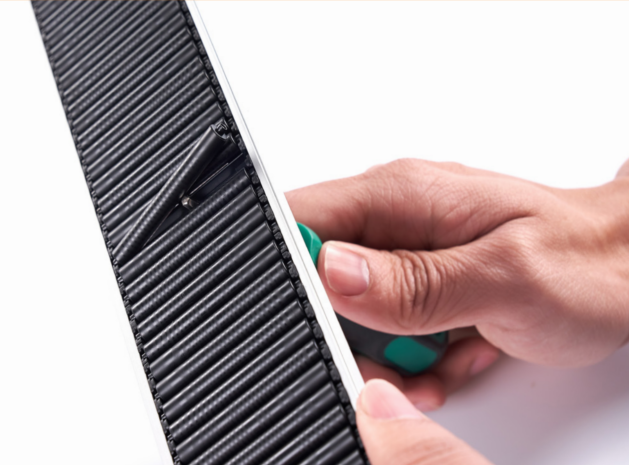Introduction: The Essential Guide to Shelf Roller Track Materials
When it comes to optimizing retail displays and warehouse storage, the right shelf roller track system makes all the difference. These tracks ensure smooth product movement, improve accessibility, and enhance overall efficiency. But what truly determines their durability and performance? The materials used.
From high-impact plastics to corrosion-resistant metals, each material brings unique benefits and applications. Selecting the best option requires balancing factors like load capacity, environmental conditions, and budget.
In this guide, we’ll break down the most commonly used materials in roller track systems, compare their strengths, and help you determine which is best suited for your business needs. Whether you’re a retailer, supermarket owner, or equipment distributor, understanding material choices will help you make informed decisions for long-term success.
Understanding Shelf Roller Track Systems
What Are Shelf Roller Tracks and How Do They Work?
Ever wondered how products smoothly glide forward on retail shelves?
That’s the power of a roller track system—a simple yet effective solution designed to improve product accessibility and organization. These tracks are installed on retail shelves, ensuring items move forward as shoppers pick them up.
But how do they actually work?
Each track consists of rollers or sliding surfaces that reduce friction, allowing products to move effortlessly. Whether in supermarkets, pharmacies, or warehouses, this system prevents clutter, minimizes manual restocking, and enhances customer convenience.
Key Benefits of High-Quality Materials in Roller Tracks
Not all tracks are created equal.
The materials used in their construction determine:
✅ Durability – Some materials resist wear and tear better than others.
✅ Smoothness – Lower friction means products move seamlessly.
✅ Maintenance Needs – The right materials reduce upkeep costs.
Choosing the best material isn’t just about strength—it’s about efficiency. Whether it’s plastic, metal, or a hybrid, the right selection directly impacts performance and longevity.
The Most Common Materials Used in Shelf Roller Track Systems
Plastic (PET, ABS, and Polycarbonate)
Plastics dominate the retail shelving world, and for good reason.
Materials like PET (Polyethylene Terephthalate), ABS (Acrylonitrile Butadiene Styrene), and Polycarbonate offer lightweight, cost-effective, and moldable solutions. These synthetic compounds provide:
🔹 Flexibility – Easily shaped to fit custom designs.
🔹 Impact Resistance – Withstands frequent use without breaking.
🔹 Moisture Resistance – Perfect for refrigerated or humid environments.
PET, in particular, is widely used due to its eco-friendly nature and high transparency, making it an excellent choice for retail display systems. Meanwhile, ABS and polycarbonate bring extra strength for high-traffic areas.
Metal (Aluminum & Stainless Steel)
Looking for something stronger?
Aluminum and stainless steel offer unmatched durability. Unlike plastic, these metals:
🔸 Resist corrosion – Ideal for humid and outdoor environments.
🔸 Handle heavier loads – Perfect for bulk storage and warehouses.
🔸 Extend longevity – Require less frequent replacement.
While metals add strength, they also increase costs. That’s why many businesses use them strategically in areas with high product turnover or extreme conditions.
Hybrid Materials (Plastic-Metal Combinations)
Why choose one when you can have the best of both worlds?
Hybrid roller tracks combine plastic’s flexibility with metal’s durability. These systems are designed to:
✔ Reduce weight while maintaining strength.
✔ Provide cost-effective durability.
✔ Improve resistance to temperature changes.
By integrating these materials, businesses can enjoy longevity without the excessive weight of full-metal designs.
How Material Choice Affects Performance
Load-Bearing Capacity
Not all shelving needs are the same.
Some shelf tracks support lightweight products like snacks, while others must handle heavier goods like beverage bottles. The material used plays a crucial role in determining weight tolerance.
🟢 Plastic: Best for lightweight, fast-moving items.
🟠 Aluminum: Handles moderate weight with ease.
🔴 Steel: The top choice for heavy-duty applications.
Friction and Smoothness
Ever struggled with items getting stuck on the shelf?
The friction level of a roller track affects how smoothly products move. High-friction surfaces slow down movement, while low-friction materials allow for effortless gliding.
💡 PET and Polycarbonate: Great for smooth movement with minimal resistance.
💡 Aluminum Rollers: Provide a balance of strength and reduced friction.
Choosing the right friction level ensures that items move efficiently without causing jams.
Temperature and Environmental Resistance
Different environments require different materials.
- Cold storage areas need materials that won’t crack under freezing conditions.
- High-temperature spaces demand heat-resistant solutions.
- Outdoor shelving benefits from corrosion-resistant metals.
✅ PET and Stainless Steel work well in humid conditions.
✅ Polycarbonate withstands high temperatures.
✅ Hybrid options offer a balance of both.
By selecting the right material, businesses can avoid unnecessary replacements due to environmental wear and tear.
Cost Considerations for Different Materials
Budget-Friendly vs. Premium Materials
Is a higher price tag always worth it?
That depends on your business needs. Plastic tracks are more affordable upfront, but metal tracks offer a longer lifespan.
💲 Low-cost option: Plastic tracks – best for short-term use.
💰 Mid-range: Hybrid designs – balance cost and durability.
💎 Premium: Stainless steel – the strongest, but also the most expensive.
Long-Term Cost Savings
Saving money isn’t just about initial costs—it’s about maintenance and replacements.
A cheaper option may require frequent repairs, while a durable investment lasts years.
🛠 Plastic tracks = low cost but may need periodic replacements.
🔩 Metal tracks = high cost upfront but minimal long-term expenses.
For businesses looking to cut down on future maintenance, opting for a durable material can lead to greater savings over time.
Sustainability and Eco-Friendly Material Options
Recycled Plastics and Their Benefits
Sustainability is no longer a trend—it’s a necessity.
Many modern roller track systems are now made with recycled PET, reducing environmental impact without sacrificing performance.
♻ Recycled PET – Strong, lightweight, and eco-friendly.
♻ Reprocessed ABS – Maintains durability while cutting waste.
Using recycled materials helps businesses meet sustainability goals while reducing production costs.
Biodegradable and Low-Impact Alternatives
What about green alternatives?
While biodegradable materials are not yet widely used in shelving systems, research is underway to develop low-impact solutions. Some companies are exploring bio-based plastics that decompose naturally.
🌱 Future innovation: Biodegradable plastics in shelving.
🌱 Low-carbon solutions: Metal tracks made from recycled alloys.
By investing in eco-conscious materials, businesses not only enhance their brand image but also contribute to a greener retail industry.
Final Thoughts on Materials for Roller Track Systems
The right shelf track material depends on:
✅ Load requirements – Heavy-duty or lightweight use?
✅ Budget – Affordable plastic or long-term metal investment?
✅ Sustainability goals – Standard vs. eco-friendly options?
By choosing wisely, retailers and distributors can maximize efficiency, cut costs, and create a long-lasting shelving system that meets their business needs.
Stay tuned for the next sections, where we’ll explore industry-specific material preferences, innovative solutions, and expert recommendations to help you make the best decision. 🚀
Industry-Specific Material Preferences
Retail and Supermarket Shelving
Ever wondered why some retail shelves look pristine while others wear out quickly?
In supermarkets and retail stores, roller track systems need to withstand constant use. Customers are frequently picking up and replacing items, making durability a key factor.
🔹 Plastic (PET & Polycarbonate) – Ideal for fast-moving consumer goods like snacks and beverages.
🔹 Aluminum Tracks – Used for heavier products like bottles and canned goods.
🔹 Hybrid Systems – A combination of materials to balance affordability and durability.
Retailers prefer materials that are lightweight yet strong enough to handle everyday wear and tear without frequent replacements.
Industrial and Warehouse Applications
In high-volume storage environments, shelving needs to handle heavier loads and tougher conditions.
💪 Steel Tracks – Best for large-scale storage due to superior strength.
💪 Reinforced Plastic – Works well for mid-weight items without adding extra cost.
💪 Hybrid Models – Often used in automated storage and retrieval systems.
Warehouses prioritize load capacity and longevity, making metal the top choice for bulk storage while plastic options are reserved for lighter, frequently moved goods.
Specialty Stores and High-End Retail
Luxury retail is all about presentation.
High-end stores focus on both function and aesthetics, meaning custom materials often come into play.
✨ Tempered Glass with Metal Frames – Used for premium product displays.
✨ Polycarbonate Tracks – Chosen for a sleek, transparent look.
✨ Custom-Coated Aluminum – Adds a refined finish while maintaining strength.
These businesses invest in materials that enhance product visibility and elevate the shopping experience.
Innovations in Shelf Roller Track Materials
Advanced Composite Materials
Technology is reshaping the way shelving systems are designed.
New composite materials blend multiple elements to create stronger, lighter, and more durable tracks. These advancements are helping retailers:
🚀 Improve product movement efficiency
🚀 Reduce material fatigue
🚀 Extend shelf life while cutting costs
Expect more hybrid options to dominate the market as businesses seek high-performance yet cost-effective solutions.
Smart Materials and IoT Integration
The future is smart shelving.
Retailers are integrating electronic shelf labels and automation into their roller track systems, requiring advanced materials that support connectivity and adaptability.
💡 Conductive Plastics – Used in smart shelving to enhance digital label performance.
💡 Flexible Metal Alloys – Allow seamless integration with automated restocking systems.
💡 Temperature-Adaptive Materials – Help adjust shelf conditions based on product type.
With the rise of retail technology, manufacturers are developing materials that enhance both durability and digital compatibility.
Choosing the Right Material for Your Needs
Key Factors to Consider
Not sure which material suits your business best?
Ask yourself these key questions:
❓ What type of products will be stored?
❓ How frequently will the tracks be used?
❓ Will they be exposed to extreme temperatures or humidity?
These factors directly impact material choice, ensuring your shelving system is efficient and long-lasting.
Expert Recommendations and Best Practices
Industry professionals recommend customizing materials based on business needs rather than opting for a one-size-fits-all solution.
✅ For retail stores: PET or aluminum for affordability and function.
✅ For warehouses: Stainless steel or hybrid options for durability.
✅ For luxury retail: Aesthetic materials like glass or coated metals.
Selecting the right material means reducing maintenance, improving efficiency, and cutting costs in the long run.
Conclusion
Choosing the right roller track material is more than just a cost decision—it directly affects efficiency, longevity, and overall business success.
🔹 Plastic for cost-effective flexibility
🔹 Metal for strength and heavy loads
🔹 Hybrid options for balanced performance
By considering your specific needs, you can maximize functionality, reduce maintenance, and improve customer experience.
Ready to upgrade your shelving system? Invest in the right material today and ensure seamless product movement for years to come. 🚀



